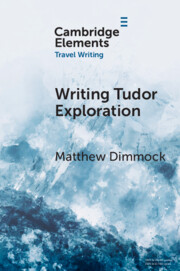Element contents
Writing Tudor Exploration
Published online by Cambridge University Press: 15 July 2022
Summary
- Type
- Element
- Information
- Series: Elements in Travel WritingOnline ISBN: 9781009047005Publisher: Cambridge University PressPrint publication: 11 August 2022
References
Primary Sources
Secondary Sources
- 4
- Cited by



